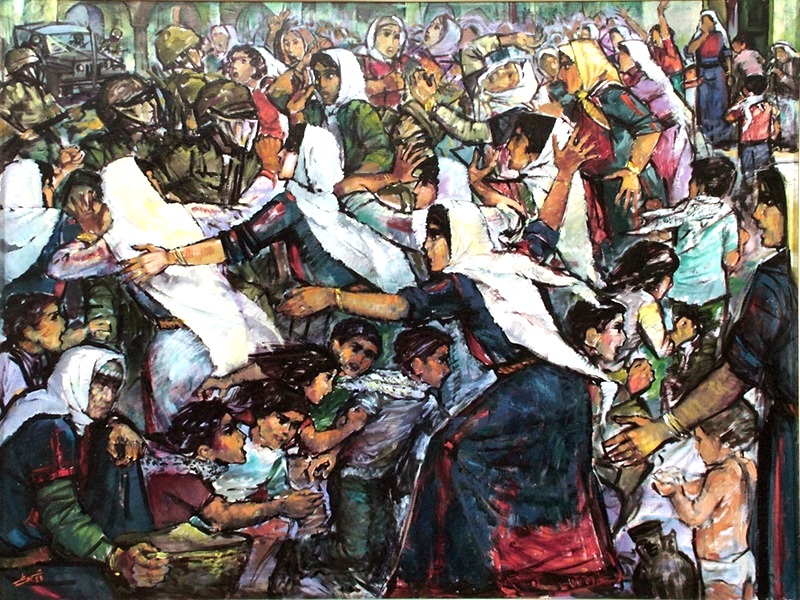Israel’s bombing of Beirut mirrors its harsh attacks on Gaza and symbolises the disdain for human life that characterises both Israeli and U.S. warfare.

Ayman Baalbaki, Lebanon, Untitled, 2020.
By Vijay Prashad
Tricontinental: Institute for Social Research
 On Oct. 1, U.S. Rep. Michael McCaul (R-TX), the chair of the House Foreign Affairs Committee issued a statement urging U.S. President Joe Biden to “place maximum pressure on Iran and its proxies, rather than pressure Israel for a ceasefire. We need to expedite arms transfers to Israel that this administration has delayed for months, including 2,000-pound bombs, to ensure Israel has all the tools to deter these threats.”
On Oct. 1, U.S. Rep. Michael McCaul (R-TX), the chair of the House Foreign Affairs Committee issued a statement urging U.S. President Joe Biden to “place maximum pressure on Iran and its proxies, rather than pressure Israel for a ceasefire. We need to expedite arms transfers to Israel that this administration has delayed for months, including 2,000-pound bombs, to ensure Israel has all the tools to deter these threats.”
McCaul’s belligerent call came days after Israel used over 80 U.S.-made 2,000-pound bombs and other munitions on Sept. 27, to strike a residential neighbourhood in Beirut and kill – amongst hundreds of civilians – Sayyed Hassan Nasrallah (1960–2024), the leader of Hezbollah. In this one bombing raid, Israel dropped more of these “bunker buster” bombs than the United States military used in its 2003 invasion of Iraq.
A former U.S. aviator, Commander Graham Scarbro of the U.S. Navy, reviewed the evidence of the Israeli strikes for the U.S. Naval Institute. In a very revealing article, Scarbro notes that Israel “seems to have taken a notably different approach to collateral damage than U.S. forces over the past few decades.”
While the U.S. has never demonstrated any significant concern for civilian casualties or “collateral damage,” it is worth noting that even senior U.S. military officials have raised their eyebrows at the degree of Israel’s disregard for human life. Israel’s military, Scarbro writes, “seems to have a higher threshold for collateral damage… meaning they strike even when chances are higher for civilian casualties.”

Bassim al-Shaker, Iraq, “Symphony of Death 1,” 2019.
Despite Washington’s knowledge that the Israelis have been bombing Gaza, and now Lebanon, with complete abandon — and even after the International Court of Justice ruled that it is “plausible” that Israel is committing genocide against the Palestinians in Gaza — the United States has continued to arm the Israelis with deadly weaponry.
On Oct. 10, 2023, Biden said, “We’re surging additional military assistance,” which has amounted to a record-level of at least $17.9 billion during the past year of genocide. In March, The Washington Post reported that the U.S. had “quietly approved and delivered more than 100 separate foreign military sales to Israel that amounted to ‘thousands of precision-guided munitions, small-diameter bombs, bunker busters, small arms and other lethal aid.”
These “small” sales fell below the minimum threshold under U.S. law which requires the president to approach Congress for approval (which anyway would not have been denied). These sales amounted to the transfer of at least 14,000 of the 2,000 pound MK-84 bombs and 6,500 500-pound bombs that Israel has used in both Gaza and Lebanon.
In Gaza, the Israelis have routinely used the 2,000-pound bombs to strike areas populated by civilians — who had been told to take refuge at these locations by the Israeli authorities themselves.
“In the first two weeks of the war,” The New York Times reported, “roughly 90 percent of the munitions Israel dropped in Gaza were satellite-guided bombs of 1,000 or 2,000 pounds.”
In March, U.S. Sen. Bernie Sanders (I-VT) tweeted,
“The US cannot beg Netanyahu to stop bombing civilians one day and the next send him thousands more 2,000 lb. bombs that can level entire city blocks. This is obscene.”
A 2016 report by Action on Armed Violence offered the following assessment of these weapons of mass destruction:
“These are extremely powerful bombs, with a large destructive capacity when used in populated areas. They can blow apart buildings and kill and injure people hundreds of metres from the point of detonation. The fragmentation pattern and range of a 2,000lb MK 84 bomb are difficult to predict, but it is generally said that this weapon has a ‘lethal radius’ (i.e. the distance in which it is likely to kill people in the vicinity) of up to 360m.
The blast waves of such a weapon can create a great concussive effect; a 2,000lb bomb can be expected to cause severe injury and damage as far as 800 metres from the point of impact.”

Ismail Shammout, Palestine, “Guardian of the Fire,” 1988.
I have several times walked around the Beirut neighbourhood of Haret Hreik in Dahiyeh, which was struck by Israeli bombs in the attack on the Hezbollah leadership. This is a highly congested area, with barely a few metres between high-rise residential buildings. To strike a complex of these buildings with over 80 of these powerful bombs cannot be called “precise.”
Israel’s bombing of Beirut mirrors its harsh attacks on Gaza and symbolises the disdain for human life that characterises both Israeli and U.S. warfare. On Sept. 23, Israel bombarded Lebanon at a rate of more than one airstrike per minute. In days, Israel’s “intense airstrikes” displaced over a million people, a fifth of the entire population of Lebanon.
The first bomb to ever fall from an aircraft was a Haasen hand grenade (Denmark) dropped by Lieutenant Giulio Cavotti of the Italian Air Force on Nov. 1, 1911, onto the town of Tagiura, near Tripoli, Libya. A hundred years later, in a grotesque commemoration of sorts, French and U.S. aircraft bombed Libya once more as part of their war to overthrow the government of Muammar Gaddafi.
The ferocity of aerial bombing was understood from the very outset, as Sven Lindqvist documented in his book, A History of Bombing (2003). In March 1924, U.K. Squadron Leader Arthur “Bomber” Harris authored a report (later expunged) about his bombings in Iraq and the “real” meaning of aerial bombardment:
“Where the Arab and Kurd had just begun to realise that if they could stand a little noise, they could stand bombing … they now know what real bombing means, in casualties and damage; they now know that within forty-five minutes a full-sized village … can be practically wiped out and a third of its inhabitants killed or injured by four or five machines which offer them no real target, no opportunity for glory as warriors, no effective means of escape.”
A hundred years later, these words of “Bomber” Harris aptly describe the kind of ruthlessness inflicted on both Palestine and Lebanon.

André Masson, France, “There Is No Finished World,” 1942
You might ask: what about the rockets fired on Israel by Hezbollah and Iran? Are they not part of the brutality of war? Certainly, these are part of the ugliness of warfare, but an easy parallel cannot be drawn.
Iran’s ballistic missiles followed Israel’s attack on an Iranian diplomatic facility in Syria in April, the assassination of Hamas leader Ismail Haniyeh in Tehran following the inauguration of Iranian President Masoud Pezeshkian in July, the assassination of Nasrallah in Beirut in September, and the killing of several Iranian military officials.
Significantly, whereas Israel has launched countless strikes targeting civilians, medical personnel, journalists, and aid workers, Iran’s missiles exclusively targeted Israeli military and intelligence facilities and not civilian areas. Hezbollah, meanwhile, targeted Israel’s Ramat David Airbase, east of Haifa, in September.
Neither Iran nor Hezbollah have fired their munitions into congested neighbourhoods of Israeli cities. Since Oct. 8, 2023, Israeli airstrikes against Lebanon have far outnumbered Hezbollah’s strikes against Israel.
Before the current wave of hostilities, by Sept. 10, Israel had killed 137 Lebanese civilians and displaced hundreds of thousands of Lebanese from their homes; meanwhile, Hezbollah rockets had by then killed 14 Israeli civilians, with their rockets leading to the evacuation of 63,000 Israeli civilians.
There has been not only a quantitative difference in the number of strikes and death toll, but a qualitative difference in the use of violence. Violence that is directed largely at military targets, is permissible in certain conditions under international law; violence that is indiscriminate, such as when massive bombs are used against civilians, violates the laws of war.

Etel Adnan, Lebanon, Untitled, 2017.
Etel Adnan (1925–2021), a Lebanese poet and artist, grew up in Beirut after her parents fled the collapsing Ottoman Empire that became modern day Turkey. She dug deep into the soil of conflict and pain, the ingredients for her poetry. Her voice resonated from the balcony of her apartment in Ashrafieh, the “little mountain,” from where she could see the ships come in and out of the port.
When Etel Adnan died, the novelist Elias Khoury (1948–2024), who himself died just before Beirut was again bombarded, wrote that he mourned a woman who would not die, but he feared for his city which was suffering alone. Here are a few extracts from Etel’s poem, “Beirut, 1982,” to remind us that we are as angry as a storm.
I never believed
that vengeance
would be a tree
growing in my garden
*
Trees grow in all directions
So do Palestinians:
uprooted
and unlike butterflies
wingless,
earthbound,
heavy with love
for their borders and their
misery,
no people can go forever behind
bars
or under the rain.
…
We shall never cry with tears
but with blood.
…
It is not on cemeteries that we shall
plant grain
nor in the palm of my hand
We are as angry as a storm.
Vijay Prashad is an Indian historian, editor and journalist. He is a writing fellow and chief correspondent at Globetrotter. He is an editor of LeftWord Books and the director of Tricontinental: Institute for Social Research. He is a senior non-resident fellow at Chongyang Institute for Financial Studies, Renmin University of China. He has written more than 20 books, including The Darker Nations and The Poorer Nations. His latest books are Struggle Makes Us Human: Learning from Movements for Socialism and, with Noam Chomsky, The Withdrawal: Iraq, Libya, Afghanistan and the Fragility of U.S. Power.
This article is from People’s Dispatch and was produced by Globetrotter.
Views expressed in this article and may or may not reflect those ofConsortium News.
Please Donate Today to CN’s Fall Fund Drive



What I love about Vijay’s articles is his inclusion (guessing it’s Vijay not CN) of art & poetry to STRIKE that emotional edge needed given the seriousness of the topics he covers.
This commenter also believes that same seriousness is how we American cits should regard our government’s willingness to vend
military arms overseas…
Inevitably that warlike attitude toward fellow humans eventually is turned homeward: that is local Jurisdictions contempt when policing area citizenry!
“Violence that is directed largely at military targets, is permissible in certain conditions under international law; violence that is indiscriminate, such as when massive bombs are used against civilians, violates the laws of war.”
It is peculiar to speak of “law” and violence at the same time, so that a limited amount of violence, applied in a particular way, is acceptable and okay with “the laws of war.” This language inscribes our primitive nature, as though war is legitimate within certain boundaries. NONE of it should be legitimate, particularly as we are now seeing psychopaths in charge wielding the incredible brutalness of today’s armaments, and then celebrating their power. Apparently, humanity is at a very low level on the evolutionary path towards actually being humane instead of scarcely veiled savages pretending to be civilized.
The US and its proxies have regressed into loathsome blood thirsty ghouls. Their lust for profit and power at any and all costs has made them indifferent to human suffering. They must be driven from power. We will not survive their global rampage for much longer. The transition to a multipolar world has begun which is driving the crazed power trippers mad. It is a very dangerous moment for our beautiful little planet. We dare not let them win.
Thanks, Vijay ji!
USA helps not only do the money laundering for the #CannibalEconomy (predicated on death and destruction), but all the more so conducts the bigger operation of the “morality laundering,” so the blood of innocent non-combatants gets on the hands of anyone who handles a US Dollar and renders them consenting participants to this evil.
That is why, for example, a man wearing a shirt with a Palestinian flag in public in Germany is carted off by their state Gestapo, because it threatens the “Out of Sight, Out of Mind” self-satisfaction pretenses of Potemkin morality at least enough to hide the profound levels of moral bankruptcy, hiding the blood stains of all the economic participant sponsors of the bloody black mass (Barbarians lack the Mahakala culture with related internal processes of evolution).
When sustainable fair trade is moving resiliently through the BRICS corridors, with prosperity for all between the Caspian Sea and Svat Valley, where peace yields the harmony of thriving economies of cultural tourism & related services, the peace dividend will be known and seen to all as more prosperous than #foreverwars.
Sadly with its current course, the Mediterranean cultural tourism will draw none other than those looking to gawk at the remnants of the largest failure of humanity since Pol Pot! USA would rather cuts its nose from its face than allow peace to break out anywhere, so lost it has become in its theocracy of nihilistic vampires and cannibals!
Thank you, Vijay! The artwork says it all. Too bad so few are reading, listening and seeing!
Thank you! Free Palestine!
I’m jarred by how much this article represents the ideology of neoliberalism and its lifeblood, measurable outcomes….. the exact size and weight of US-made and financed dropped on highest densities of Gaza people; the number of meters around certain bombs where death can be delivered; comparisons of deaths delivered in tiny Gaza in so many days to deaths delivered, say, by US attack on Iraq in the same number of days…..
Thank you, Prashad, for allowing poetry in to keep us human.
Imagine a world where everyone had access to the same weaponry. Peace.
Hallo, Fred Grosso! Imagine a world where no one had access to weapons. PEACE.
Best wishes, Marika
Marika: We can only hope your wish would be fulfilled.
As usual Vijay Prasad says what we all need to hear. Thank you for your unflinching coverage of the atrocities being meted out by the Israeli government, which is rapidly losing all claims to legitimacy. The complicity of the US government is unforgivable.
We lived in Beirut when I was a kid in the early-mid 1960s. My folks sent us to the British Community School, which was for kids from British-sphere expat families, sponsored by the UK Embassy. The school was located on the old airport road south of Beirut, now called Imam Khomeini, near the Bourj el-Brajneh / Haret Hreik thoroughfare turning to the east. At the time, this area was all woods and open fields — very few buildings. Nature is long gone — it’s all completely built up. I guess it was bound to happen… Israel has gone berserk, targeting such heavily-built up neighborhoods. Lebanon is a helpless bystander in this U.S.-made disaster.